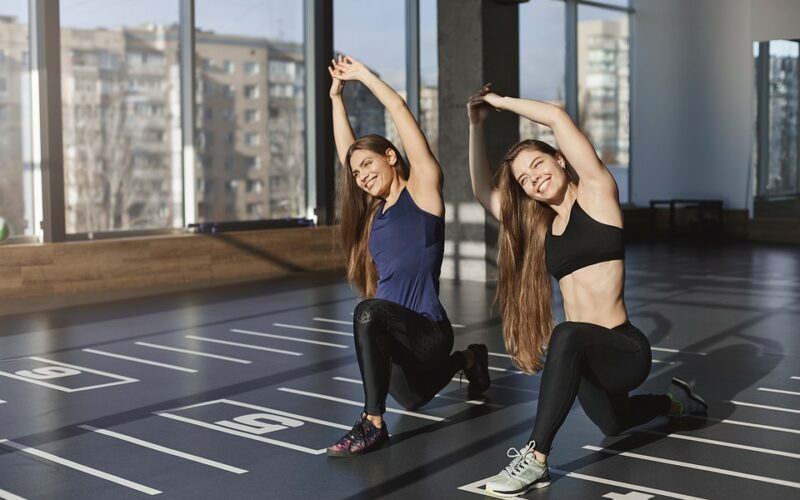A Gradual Return To Fitness
After a spell of inactivity, it's vital to acknowledge the body's need for a gradual return to a fitness routine. Embarking on an overly ambitious exercise regimen can not only lead to discouragement but also raises the risk of injury.
It's advisable to start with low-impact activities that align with one's current fitness level and to incrementally increase the intensity. This approach helps in building a sustainable habit, fostering both physical adaptability and mental resilience. Moreover, integrating proper nutrition and ensuring adequate rest are equally important to support this transition effectively.
Adopting a multi-faceted approach to wellness is crucial for maintaining a healthy balance in life. It is not enough to focus solely on one's diet; lifestyle adjustments and regular physical activity are equally important.
Nutrition should be about consuming a variety of foods that provide the necessary vitamins and minerals, while controlling portion sizes and avoiding excessive sugar and fats.
In terms of lifestyle, prioritising sleep, managing stress, and fostering social connections can significantly boost mental health. Meanwhile, incorporating different forms of physical activity, from resistance training to flexibility exercises, contributes to overall physical well-being and can prevent various chronic diseases.
Together, these components synergistically work to enhance one's quality of life, promoting a state of complete physical, mental, and social well-being.
Nutrition
A balanced diet comprises a variety of food items from all the major food groups: fruits, vegetables, proteins, grains, and dairy.
It is key to supply the body with the essential nutrients it requires, which include carbohydrates for energy, proteins for muscle repair and growth, fats for energy storage and vitamin absorption, vitamins and minerals for cellular function, and water for hydration and metabolic processes.
Integrating a rainbow of fruits and vegetables can ensure a broad intake of vitamins and minerals, while whole grains provide necessary fibre for digestive health. It's also important to maintain a balance, as an excess or deficiency in any of these nutrients can lead to health issues.
Making simple dietary adaptations can lead to substantial health improvements. Opting for whole foods such as fruits, vegetables, whole grains, nuts, and seeds over processed ones is advised. Whole foods are packed with essential nutrients, fibre, and antioxidants that aid digestion, support immune function, and may reduce the risk of chronic diseases.
Additionally, prioritising hydration by drinking ample water throughout the day benefits metabolism, skin health, and cognitive function, while also helping to control hunger and enhance satiety.
These minor tweaks in eating habits are manageable steps towards embarking on a journey to a healthier self.
Lifestyle changes
Adopting a mindset focused on incremental improvement can lead to more substantial long-term health benefits. For example, integrating more fruits and vegetables into one's diet piece by piece can be more effective than an abrupt dietary overhaul.
Similarly, slowly increasing physical activity, perhaps starting with short walks and progressively intensifying to regular jogs or gym sessions, prevents burnout and injury. It’s the consistency of these small lifestyle adjustments that culminates in a healthier, more vibrant life.
Quality sleep and effective stress management are critical components of overall well-being. Sleep serves as a restorative process for the brain and body, consolidating memories, and rejuvenating cellular structures, leading to improved concentration and cognitive function.
Simultaneously, maintaining low stress levels enables hormonal balance, underpinning emotional stability and reducing the risk of chronic conditions like hypertension and diabetes.
Together, these elements create a foundation for a resilient immune system and contribute significantly to a person’s longevity and quality of life.
Personal training
A personal trainer serves not just as a guide but as a mentor, motivator, and key resource for anyone seeking a tailored approach to their fitness goals.
With expertise in creating customised workout plans, they can assess an individual's current fitness level, personal objectives, and potential barriers to craft a regimen that maximises effectiveness while minimising the risk of injury.
Moreover, personal trainers help in establishing realistic timelines and milestones, ensuring the motivation remains high with noticeable progress. Their support goes beyond the gym floor, often extending to areas such as nutrition and lifestyle habits, which are pivotal in achieving holistic wellbeing.
Setting realistic goals is a crucial step in any successful health and fitness journey. Working with a personal trainer, individuals can establish objectives that are tailored to their physical capabilities and lifestyle.
This personalised approach ensures that the targets are attainable, thereby fostering motivation and preventing the discouragement that can accompany unrealistic expectations. A personal trainer brings professional expertise to the process, helping to formulate a balanced routine that addresses both strengths and areas for improvement.
Swimming
Swimming is widely known as an exercise for individuals seeking to resume physical activity after a period of inactivity due to injury or illness.
The buoyancy of water provides a supportive environment that reduces stress on joints and muscles, thereby minimising the risk of injury. This supportive nature allows for a full range of motion, which is beneficial for improving flexibility and overall mobility.
Furthermore, swimming engages multiple muscle groups and provides a full-body workout, which can contribute to a quicker recovery and a return to peak physical condition.
Incorporating swimming into your routine requires a strategic approach, especially for beginners. Firstly, ensure you're equipped with the right gear, including a comfortable swimsuit, goggles, and a cap to protect your hair from chlorine.
Starting with one or two sessions per week is a manageable way to acclimate your body to the new form of exercise. It's also important to set realistic goals; begin with short laps focusing on technique and gradually increase distance and intensity.
Consider joining a swimming class or finding a swim partner to stay motivated. Remember to always start with proper warm-up exercises to prevent injuries and maximise performance in the water.
Walking
The act of walking, often overshadowed by high-intensity workouts and complex fitness regimes, is a surprisingly potent form of physical activity with a plethora of health advantages. It is a low-impact exercise that can bolster cardiovascular fitness, aid in maintaining a healthy weight, and improve the stability and strength of muscles and bones.
Moreover, walking is conducive to mental wellbeing, offering a chance for mindfulness, stress reduction, and the psychological lift that comes from being outdoors. In an age where sedentary lifestyles are becoming the norm, incorporating regular walks into daily routines can be a simple yet effective strategy for enhancing overall health.
Building a feasible walking plan is crucial for making this simple yet effective exercise a staple in your routine. Start by setting realistic goals, such as aiming for a daily 10-minute walk and gradually increasing the duration as your endurance improves.
Mapping out several visually stimulating routes will provide variety and maintain your interest. To seamlessly incorporate walking into your life, consider walking to work, using stairs instead of elevators, or scheduling walk-and-talk meetings.
Furthermore, a pedometer or a smartphone app can motivate you by tracking your steps and progress, turning your journey into a game of personal milestones to beat.
Incorporating healthier choices
Making the decision to embark on a journey towards better health can often seem daunting, but it is important to remember that every step counts, no matter how small.
Begin by setting achievable goals and gradually incorporating healthier choices into your daily routine. Whether it's opting for a nutritious breakfast, taking a brisk walk in the park, or ensuring you get enough sleep each night, these small changes can build a solid foundation for a more vibrant and healthier you.
Remember, the road to wellness does not require drastic changes overnight; rather, it is paved with consistent, mindful decisions that contribute to long-term well-being.












